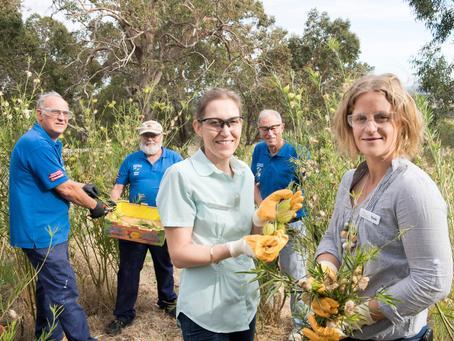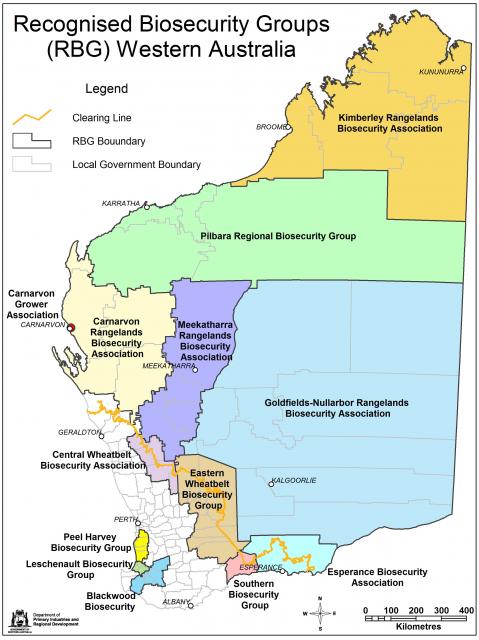Buy West Eat Best celebrates 10 years
Buy West Eat Best, the State’s unique local food branding program, is celebrating 10 years of promoting and supporting Western Australia’s local food and beverage industry.
The program, which features the iconic Buy West Eat Best green State logo, was born out of consumer frustration about being unable to identify and purchase local food products.
While the food industry has changed significantly since the program was launched in 2008, its mission remains the same – to identify, support and promote locally grown, farmed, fished and processed produce.
The Department of Primary Industries and Regional Development continues to manage the program, hand-in-hand with businesses, industry and regional communities.
Partnership
Buy West Eat Best is more than a State-of-origin labelling system, it is a partnership with agribusinesses throughout Western Australia that continues to strengthen year-by-year.
The department and Buy West Eat Best members are committed to expanding consumer brand recognition via co-invested promotion and marketing activities, backed by market research and evaluation.
Membership has grown from 38 founding partners to more than 150, including major retailers, small growers, artisan producers, large scale processors, restaurant and food service providers.
The first few years were spent establishing the brand and increasing membership, as consumer awareness of the program grew.
Research backed promotion
In 2010 the first advertising campaign, Get vocal about eating local, was launched with co-contributions from members, building on brand awareness from the logo and in-store promotions.
Since then, consumer interest in food providence has soared, alongside evolution of social media and television cooking programs.
Buy West Eat Best has capitalised on this interest and new promotional channels creating strong integrated marketing campaigns, such as the high-profile WA Signature Dish cooking competition that promoted regional produce and communities.
Campaign reports from the inaugural event in 2014 showed more than 500,000 social media users were engaged during the three month campaign, via Facebook, Instagram and Twitter.
Several influential food bloggers were engaged in the program, while traditional media monitoring revealed more than $1 million worth of exposure for the WA Signature Dish was generated.
More recent independent market research undertaken in March 2018 demonstrated strong Buy West Eat Best brand awareness, with 71 per cent of survey respondents recognising the brand, and 90 per cent of respondents more likely to consider buying a product with the logo.
When retailers applied the Buy West Eat Best logo to a shelf sticker in store, research showed a sales increase of 10 per cent, with one-in-four consumers actively looking for the logo when grocery shopping.
Current campaigns
The 2018 marketing program features the Taste of WA campaign at Yagan Square in central Perth, to showcase the best produce from the Peel, Gascoyne, Swan Valley and surrounds and the South West region.
Each partner region champions local chefs, farmers, producers and community leaders, who cook and create conversations with consumers – bringing the country to the city.
The campaign complements other State Government endeavours to attract gourmet travellers to enjoy WA’s outstanding produce.
The Good Choice television and marketing initiative is another current high-profile campaign, featuring a young man followed by a group of farmers, producers and chefs applauding his ‘good choice’ at selecting WA produce.
Preliminary research has already shown increased brand awareness from the advertising campaign while 33 new members have signed up to Buy West Eat Best since the campaign began in July 2017.
Broad benefits
All WA agrifood businesses, regardless of their size, can leverage from the Buy West Eat Best campaign by simply applying the logo, while even non-members benefit from the call to action for consumers to seek out and purchase local products.
Consumers also benefit from being more aware of the range of locally grown, farmed, fished and processed produce, which is fresher, tastier and has lower food miles.
Buy West Eat Best has more celebrations planned in the coming months to champion local produce and continue to build on its achievements over the past decade.
For more information about Buy West Eat Best click here or contact Melissa Worthington, program manager on +61 (0)8 368 3525.
New Recognised Biosecurity Groups to add to State’s pest defence
A new era of biosecurity management has been heralded with the formation of six new Recognised Biosecurity Groups (RBGs) in the agricultural region.
The Department of Primary Industries and Regional Development (DPIRD) has been instrumental in establishing the groups, as part of the $2.3 million Transforming Regional Biosecurity project.
The four year project, which comes to a close at the end of June, was designed to support regional communities to come together and establish an RBG to coordinate control measures for local plant and animal pests.
The new RBGs include the Central Wheatbelt Biosecurity Association, Esperance Biosecurity Association, Southern Biosecurity Group, Peel Harvey Biosecurity Group, Leschenault Biosecurity Group and the Blackwood Biosecurity Incorporated.
Meanwhile, the department is continuing to work with three other groups in the agricultural area to assist them to explore recognition.
The new additions will join the Eastern Wheatbelt RBG, formed in 2015, five groups established in the pastoral area and the Carnarvon Growers Association formed to address the eradication of Mediterranean Fruit Fly.
The department has worked to build the capacity of the groups to identify declared pest priorities, in consultation with the local community.
For the new groups these range from wild dogs and foxes in eastern areas to rabbits, feral pigs and weeds of significance in the South West.
Under the provisions of the Biosecurity and Agriculture Management Act 2007 (BAM Act), landholders are responsible for controlling declared pests on their property.
However, the government recognises that declared pests are not confined to property or shire boundaries – highlighting the need for a community-led control effort to successfully control widespread, established pests.
The BAM Act provides a framework for community to secure financial support from the State Government to undertake collective control by establishing an RBG.
RBGs are able to develop a plan and budget for the Minister to raise a Declared Pest Rate, which, if successful, is matched by the State Government to manage a single or multiple pests.
The rate can be applied as either a flat rate or ad valorem, based on the unimproved value of the land.
To secure funding from a Declared Pest Rate, RBGs are required to engage with the community to determine what declared pest issues are a priority affecting landholders in their area and then develop an operational plan.
DPIRD supports RBGs to make these decisions with input and advice, which is explained in a guidance manual for groups.
The new RBGs in the agricultural region have been working with the community to build a proposal and support for a Declared Pest Rate, including written communication about any intended rate.
This includes hosting workshops to enhance landholders’ knowledge and skills to control declared pests on their land, such as herbicide spraying and feral pig and rabbit control methods.
The Eastern Wheatbelt RBG, recognised in 2015, had a rate determined across 11 shires to assist efforts to control wild dogs in 2016/2017.
Typically, the rate averages less than $50 per year per landholder, which translates to about $200,000, which is matched dollar-for-dollar by the State Government.
This sum provides resources to support the groups’ governance operations, including administration and a part-time executive officer and funds two contractors to support landholders’ endeavours to control wild dogs in marginal areas.
The Declared Pest Rate is reviewed annually and groups are required to provide an operational plan, which includes the funds they require from the rate.
A strength of the process is that the groups are led by local people and decisions are made locally.
While each group determines its own priorities and structure, the common threads to successful RGBs are a comprehensive action plan that adds value to landholders’ efforts and good community engagement.
Experience in the pastoral region, where pest management is spread over vast areas, and in the eastern Wheatbelt has shown this approach has given local communities greater autonomy to more effectively address local biosecurity issues.
This approach underpins the shared responsibility of pest management, helping to protect agricultural production, as well as Western Australia’s enviable biosecurity reputation that opens doors to market access.
For more information about RBGs and the Declared Pest Rate click here or contact Simon Merewether, A/Director Invasive Species, Bunbury, +61 (0)8 97806291.
Agrifood and Fisheries export services portal
Accessing export-related services will be streamlined for Western Australian agrifood exporters with the launch of an online portal that brings together services offered by government and industry.
The Agrifood and Fisheries Export Services online portal was launched last month and consolidates more than 100 export-related services into a central source including grants, market intelligence, export marketing strategy and financial assistance.
It will help agrifood businesses access services that best match their needs while growing agrifood exports and job opportunities across WA.
While there are many support services available to WA businesses looking to grow their exports, they are spread across different tiers of government and industry and a need to consolidate this information was recognised.
The portal will be managed by the department.
For more information contact Courtney Draper, Director, South Perth on +61 (0)8 9363 4178.
New groundwater and salinity map launched
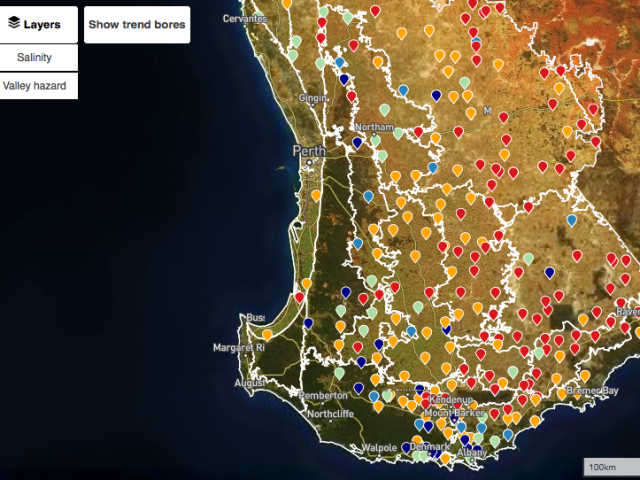
The Department of Primary Industries and Regional Development has taken a bold step forward, presenting 30 years of valuable groundwater research and monitoring data in an interactive map, allowing users to examine trends in their own area.
The Interactive groundwater and salinity map targets the south western half of the state and allows exploration of regional and local groundwater trends, the mapped extent of dryland salinity and areas with potential for increased dryland salinity.
This information supplements the valuable land capability information available on the NRInfo interactive website.
The map also provides an estimate of salt levels in the groundwater, together with likely presence and risk of salinity based on satellite imagery and landscape position.
Trend-bores on the map show where water tables are rising, stable or falling, and with all of this information, landholders will be able to adapt their land management to suit the conditions.
For example, with rising groundwater levels and a risk of salinity, consideration can be given to early engineering or alternate plant varieties.
If considering a dam to drought-proof your property, you can check bore information and the risk of salt developing to choose the safest site(s).
Zoom in and look at your local bores. You will need to do local and current measurements before going ahead, but the map will help identify areas of concern.
With this information now being made publicly available, other parties with an interest have the opportunity to value-add.
Advisors can use this information when discussing management options with you, and industry will be able to find innovative ways to make use of the data.
This platform provides opportunity for additional information to be added as it becomes available.
For more information contact Nicholas Wright, Research Officer, Bunbury, on +61(8) 9780 6286.
Support directory to help through tough times
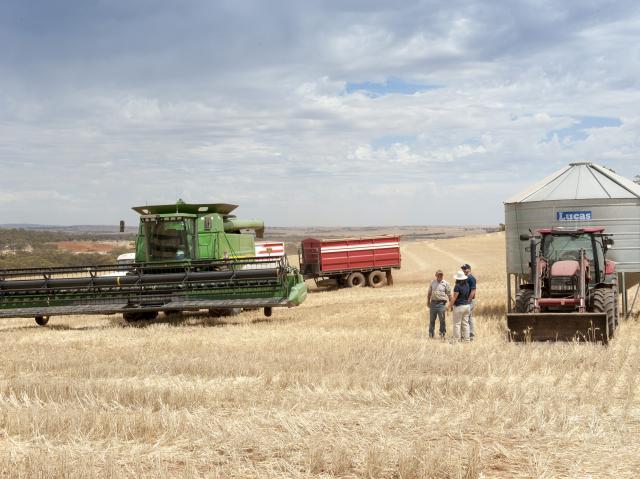
The Department of Primary Industries and Regional Development has updated its support directory with the latest contact details of organisations that can assist people in rural areas who are facing hardship.
The directory was developed after the department recognised the need for easy to find support services following dry seasons in the central wheatbelt.
The aim of the directory is to bring together the contact details and information of organisations that can assist growers experiencing stress and financial hardship due to tough seasons.
Over the years the directory has evolved with the realisation these services are relevant to all people living in rural and remote Western Australia and at all times, not just following dry seasons.
‘Western Australia’s Rural Health, Financial and Information Services Support Directory’ includes contacts for organisations that provide:
- 24 hour support
- counselling services
- mental health services
- drug support services
- financial support
- information services
- emergency contacts.
The directory is available on the DPIRD website and can also be printed as a brochure.
The department is continuously updating the directory and any additions can be emailed to Central Region Customer Support.
Free department workshops to benefit your business
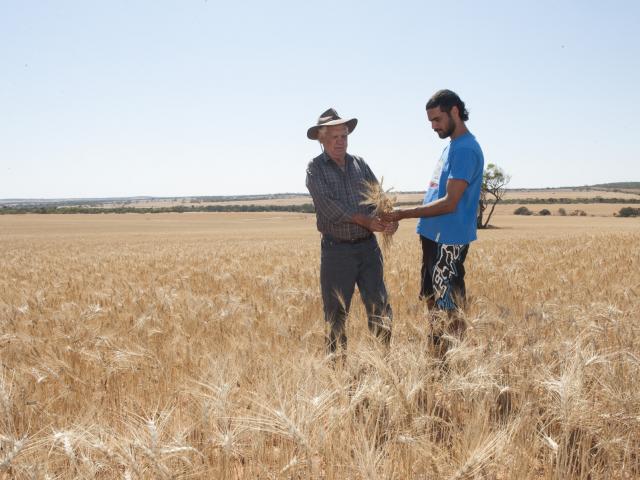
Plan, Prepare and Prosper is a free workshop program designed to assist rural businesses that are involved in farming, fishing and food processing to plan for and manage through variability in the seasons, global markets and other challenges they may face.
About the program
You can choose to attend the entire program to complete a strategic business plan or attend only those workshops that meet a specific need of your business.
There are nine workshops in the suite to choose from including:
- The key to financial management
- Introduction to strategic planning
- Financial management
- Personal and business effectiveness
- Sales and marketing
- Planning systems, continuity, innovation and change
- Succession: a business strategy
- Planning for profit
- Refreshing strategic plans.
To find out more about what’s in the workshops go to the Plan Prepare and Prosper-suite-workshops webpage.
To attend any of the Plan, Prepare and Prosper suite of workshops, register online by completing a Plan, Prepare and Prosper application form.
You can register for the full five or six day program or if you prefer, register for some of the workshops.
For further information call 1800 198 231 or email the team.
Upcoming financial management workshop
The Department of Primary Industries and Regional Development is holding a Financial management workshop at the New Norcia Hotel on Thursday 3 May.
The workshop provides an understanding of business performance and what can be done to improve it.
The workshop aims to help you measure business performance and evaluate its strength.
You will self-assess your business’ key financial indicators and draft strategies and tactics to ensure financial risks and opportunities are planned for and managed.
Workshop places are limited so anyone interested in attending, should register on the website.
For more information contact Nancye Gannaway, Development Officer, South Perth on +61 (0)8 9368 3807.
Hackathon aims to solve potential agricultural problems
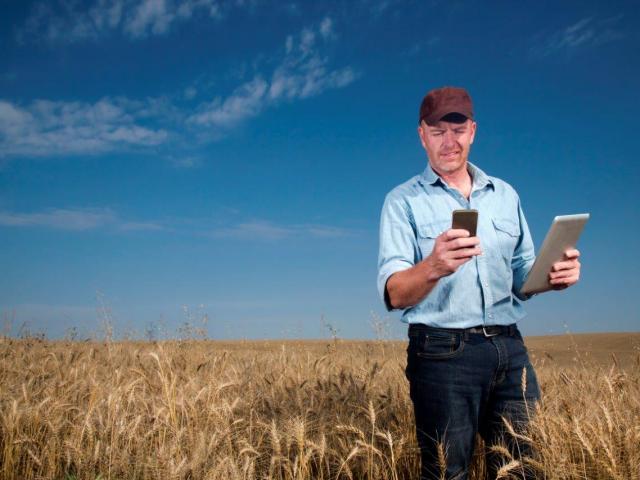
Ag-tech savvy developers and innovators are invited to work on solving potential agricultural problems at the inaugural Ag-tech hackathon, being held by DPIRD in conjunction with the Ministry of Data (MoD).
MoD is a not-for-profit, voluntary venture run under the OpenGov network, which hosts hackathons with the aim of solving technological problems faced by State Government agencies.
DPIRD’s eConnected Grainbelt Project is sponsoring the agricultural-themed hackathon, to be held from 22-24 June in Perth, which will bring together ag-tech industry participants and talented developers to try to find answers to real world problems, which industry and growers experience.
In order to make the most of this event, expressions of interest are being sought from industry to submit agricultural problems for hackathon participants to work on.
Anyone who provides data is encouraged to be available at the event in a mentoring capacity – assisting to advise teams who work on their specific problems to meet criteria, and to answer agricultural-related questions.
Suitable problems identified will be presented to participants who will be given access to several DPIRD datasets developed by the eConnected Grainbelt Project. Access to the data is being provided as part of the WA Open Data Policy. Datasets include:
- data streams from 175 regional weather stations
- recently integrated meteorological radar data
- soil classification and geospatial data
- organism (taxonomy) data
- reported endemic pest and disease (PestFax) data.
MoD will assist event winners post-hackathon to develop viable solutions through new business opportunities.
Anyone interested in being involved should contact Samantha Scott on +61 (0)8 9368 3748.
Featured staff member Tanya Kilminster

When Tanya Kilminster marched into the Merredin office in the year 2000 and asked for a job, she had no idea that she’d still be here 18 years later and loving it.
Tanya’s achievements with the department are far-reaching and its little surprise she’s this month’s featured staff member.
Hailing from the wheatbelt town of Bruce Rock, Tanya started her career with a good understanding of agricultural systems and farming mentality.
With sheep farming as her primary passion, she worked as part of the Rangelands Sheep project from 2002 and was involved in research and development with the fledgling Damara and Dorper industry assessing production, nutrition, management and markets for these non-wool sheep breeds.
Tanya still considers providing industry with recommendations for the management of non-wool sheep breeds as a result of running sheep trials one of her greatest achievements.
In 2008 Tanya managed the Future Farm Industries CRC Enrich project at the Merredin Research Station, a 2.4 hectare site assessing some 4500 individual native woody perennial plants, about 20 different species, over three years for the management of poorer performing soils such as those affected by salinity, acidity or prone to erosion.
This national project culminated in industry recommendations for the Enrich species for growers to implement into their mixed farm enterprises.
Tanya also considers providing industry with these recommendations for species selection and management a major achievement in her career with the department.
Another of Tanya’s achievements has been her recent success in attracting more than $600 000 of funds for Merredin and Districts Farm Improvement Group (MADFIG) and the Far Eastern Agricultural Research (FEAR) group.
She has been working closely with these volunteer run groups since 2015, providing both with support in accessing funding opportunities and linking them with researchers and industry.
Tanya now acts as project manager for the new project ‘Identifying investment opportunities in the sheep meat supply chain for flexible adaptation of eastern wheatbelt farm businesses’, which is funded through the Agricultural Sciences Grower Group Research and Development Fund and administered by MADFIG.
This three-year project aims to assist decision making to determine opportunities to increase farm profitability, identify appropriate on-farm investments to improve production, connect to more strategic networks and understand existing and seek new markets.
Throughout the years, industry has recognised Tanya’s hard and high quality work with invitations to speak at and collaborated on symposiums, workshops and study tours.
She’s also made an appearance on ABC’s Landline to talk about non-wool sheep breeds and their management.
Tanya’s project manager Pam I’Anson said Tanya demonstrates innovativeness and creativity through all the work she undertakes and is organised, competent, motivated, empathetic and committed.
“Throughout her career Tanya has demonstrated exceptional ability to think through situations and reach sound decisions through a staged approach,” said Pam.
“Tanya undertakes a very important role of mentoring others and it is her innate ability that she is able to impact and develop others.”
With three kids and a private farm business to look after it’s hard to determine where Tanya finds the energy.
Tanya considers herself very fortunate to have been able to have a career in agriculture, work close to home and continue to work with growers in the region to promote and innovate the sheep industry and create flexible farming systems that are profitable.
Events, grants and scholarships
Events
Responsible use of agricultural chemicals, 20 April, Manjimup
Information provided on applying for minor use permits as well as the principles of responsible use of agricultural chemicals.
Pasture assessment workshop - 28 April, Rangelands
A half-day workshop covering rangeland condition monitoring. Contact Kath Ryan 9166 4015.
Plan, Prepare, Prosper - financial management workshop, 3 May, New Norcia
This financial management workshop will provide an understanding of business performance and what can be done to improve it.
Is protected cropping the future for WA horticulture? 29 May, Mandurah
The Department of Primary Industries and Regional Development and the Peel Development Commission are hosting a state-wide forum looking at state, national and international trends and exploring the opportunities in protected cropping for horticulture across Western Australia.
Hackathon, 22 June, Perth
DPIRD's eConnected Grainbelt Project team is working with the Ministry of Data (MoD) to bring you an agriculture-themed hackathon that will bring together ag-tech savvy industry participants with talented developers to solve real-world problems.
WA Hoticultural Update, 16-17 August, Perth
Western Australia’s horticulture industries will have access to timely market information, grower case studies and industry research at the upcoming State Horticulture Update.
Grants - new this edition
Export competitiveness grant, closes 20 April
This program will invest up to $1 million to projects that can deliver industry-wide benefits to the Western Australian agrifood sector.
New industries fund, round 1 closes May
The State Government’s New Industries Fund, will allocate $4.5 million across the nine regions of Western Australia to support venture creation, accelerate small-medium enterprise growth and seed innovation initiatives.
Grants - ongoing
Accelerating Commercialisation, no closing date provided
Accelerating Commercialisation, previously Commercialisation Australia, is focused on helping start-up companies commercialise new technology.
Advanced Production Systems Fund, no closing date provided
Hort Innovation is forging partnerships with top local and international researchers, innovators, commercial enterprises and Australian growers through a new and exciting multi-million dollar Hort Frontiers strategic partnership initiative – the Advanced Production Systems Fund.
Certain Inputs to Manufacture, no closing date provided
Provides Australian manufacturers importing chemicals, plastics, paper goods and metal materials, or goods used in food packaging, with duty-free tariff concessions to help reduce their importing costs.
Entrepreneurs’ Program, no closing date provided
The Entrepreneurs’ Programme uses experienced Advisers and Facilitators, drawn from industry, to ensure businesses get the advice and support needed to improve their competitiveness, productivity and to seek growth opportunities.
Farm Co-operatives & Collaboration, no closing date provided
A $14,934,000 Federal Government initiative that aims to provide farmers, fishers and foresters with knowledge, skills and materials on collaborative ideas, co-operative structures and collective strategies.
Farm water supply planning scheme, no closing date provided
Commercial broadacre farmer experiencing water shortages can apply for rebates to fund an audit and site inspection of farm water supply and improvements.
Managing Farm Risk Programme, closes May 2019
The Managing Farm Risk Programme provides rebates for advice and assessments to help farmers prepare and apply for a new insurance policy that assists with the management of drought and other production and market risks.
NACC Habitat Fencing Initiative, 30 June 2018
This project provides funding to land managers to protect the habitat of threatened flora and fauna and areas of priority remnant native vegetation in the Northern Agricultural Region (NAR).
Pastoral Water Grants Scheme, no closing date provided
Provides grants of up to $20 000 for commercial pastoralists looking to develop alternative watering points to reduce grazing intensity around existing overgrazed and degraded water supplies.
Supplier Improvement Plan, no closing date provided
Provides tailored advice to help your business to develop a better understanding of your customer’s needs and requirements, increase your supplier capability, and improve your access to new and existing markets.
Scholarships
AWI Graduate Training Program, closes 30 April
Eighteen-month program designed for graduates is designed to foster the ambitions of graduates wishing to pursue a career within the wool industry, with each graduate to receive a mentor appropriate to their skill set and interests to guide their development throughout the program | .
Churchill Fellowship - horticulture, closes 27 April
Three Churchill Fellowships will be offered annually for four years (from 2017), specifically for international research on a topic related to horticulture.
Nuffield Australia, closes 15 June
Annually, Nuffield awards primary producers scholarships to support overseas travel and study.
Raising the Baa - Leadership in Agriculture program, WoolProducers Australia, closes 23 April
Nominations open for the AICD Company Directors Course, and the WoolProducers Australia Youth Ambassador. For more information email info@woolproducers.com.au.

